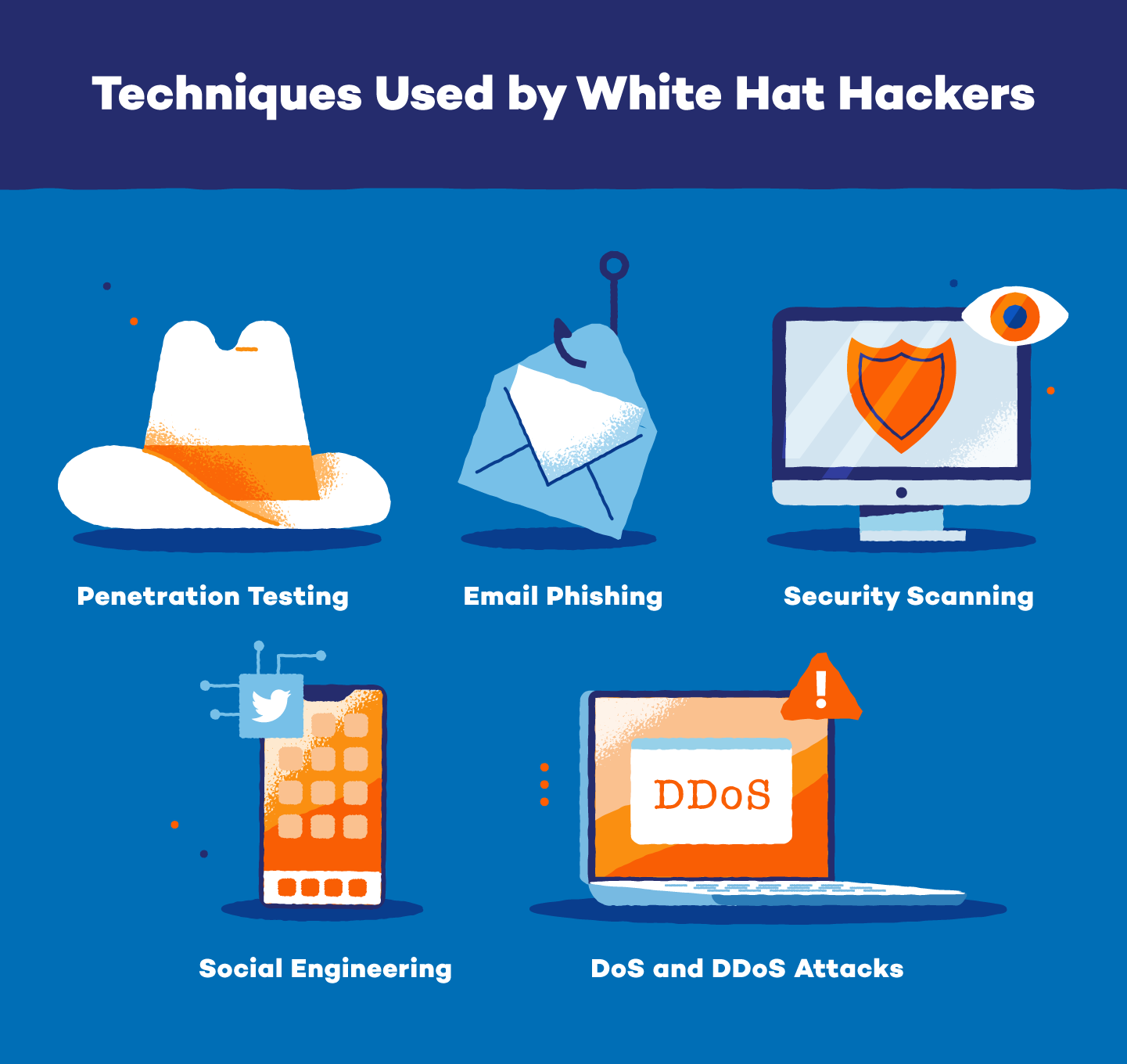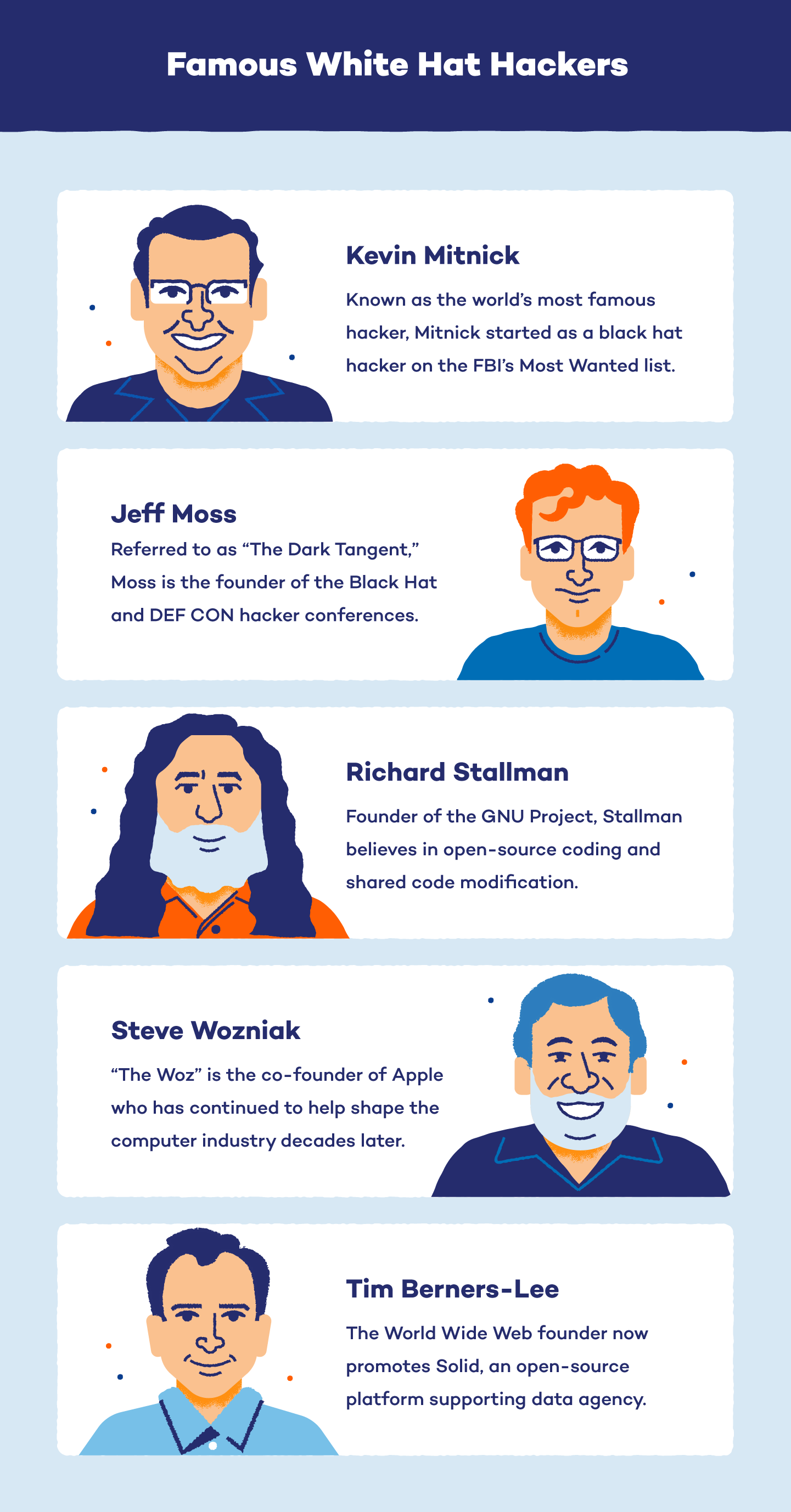A white hat hacker is an ethical computer security expert who is hired to test and improve the security of computer systems by identifying vulnerabilities and implementing preventive measures.
When we think of hacking, we often associate it with cybercrimes such as illegal online activities and data breaches. However, there’s a lesser-known type of hacking that’s entirely legal and ethical: white hat hacking.
As cybercrime evolves, prevention methods must keep pace. White hat hackers play a crucial role by helping organizations strengthen their cybersecurity defenses.
In this guide, we’ll explore the world of white hat hacking, learn the benefits of white hat hacking and understand the difference between various types of hackers.
What Is a White Hat Hacker?
A white hat hacker is someone hired legally to test an organization’s or person’s computer systems for vulnerabilities. They conduct legal and ethical hacking, with permission to breach security systems and improve cybersecurity.
The term “white hat” comes from old Western movies, where the “good guys” wore white hats, symbolizing their lawful and ethical actions. Many white hats are former black hat hackers who transitioned to legal hacking for various reasons.
Unlike other cybercriminals, white hats help organizations perform vulnerability assessments and notify the companies responsible for creating patches of any weaknesses. Instead of hacking for information and personal or political gain, white hat hackers break into systems to increase safety and reduce malicious attacks.
Types of Hackers
Besides white hat hackers, there are two other main categories of hat hackers: gray hat hackers and black hat hackers.
Gray hat hackers may engage in hacking activities without authorization but without malicious intent. They often discover vulnerabilities in systems and networks and may inform the affected parties about them, sometimes in exchange for a reward or recognition.
However, their actions can still be considered unethical or illegal, as they involve unauthorized access to computer systems.
For example, a gray hat hacker might discover a vulnerability in a popular home Wi-Fi router model. Instead of exploiting the vulnerability maliciously, they inform the manufacturer about the issue and provide recommendations for fixing it. They may also publish information about the vulnerability online to raise awareness among users.
Black hat hackers engage in hacking activities with malicious intent. They’re the ones that come to mind when you hear the word “hacker.” Black hat hackers exploit vulnerabilities in computer systems and networks for personal gain, to cause harm or for illegal activities such as stealing sensitive information, disrupting services or committing fraud.
Their actions are typically illegal and unethical, as they involve unauthorized access and malicious manipulation of computer systems.
For example, a black hat hacker could gain unauthorized access to a home user’s computer through malware distributed via email. Once inside, they steal personal information such as credit card details, login credentials and private photos. They may use this information for identity theft, financial fraud or even blackmailing the victim.
Some other types of hackers include:
- Red hat hackers: These ethical hackers actively identify and patch vulnerabilities in systems, similar to white hat hackers but often with a more aggressive approach.
- Green hat hackers: These are novice hackers who are new to hacking and still learning the ropes, often experimenting with tools and techniques without much experience.
- Blue hat hackers: These individuals are hired by organizations to bug-test a new software or system network before it’s released. Their role is to find loopholes or security vulnerabilities in the new software and remedy them before it launches.
- Yellow hat hackers: These hackers — also known as social media hackers — mainly operate on social media. They use their skills for both good and bad purposes, depending on the situation or their own interests.
White Hat vs. Gray Hat vs. Black Hat Hackers
| White Hat Hackers | Gray Hat Hackers | Black Hat Hackers |
|---|---|---|
| Legally hired | Not hired legally | Not hired legally |
| Notify organizations about vulnerabilities | Hack without permission but won’t exploit systems or cause damage | Sell, use, or exploit vulnerabilities |
| Express good intentions | Express morally gray intentions | Express bad and damaging intentions |
| Prioritize the law | Prioritize personal morals | Prioritize personal or political gain |
White Hat Security Techniques
White hat hackers and black hat hackers use the same tools and techniques to breach security systems. However, instead of exposing an organization to danger, white hats help protect its security status. Generally, white hats use techniques like:
- Penetration testing: A penetration test helps determine an infrastructure’s weaknesses and potential entry points. These are then reported to the organization.
- Email phishing: Legal phishing scams — also known as anti-phishing campaigns — are enacted to find potential vulnerabilities. These are also used to teach infrastructure users what a phishing scheme may look like.
- DoS and DDoS attacks: A denial-of-service attack stops or changes the performance of a network or security system. White hats will reproduce these types of attacks so organizations can adapt their response plans.
- Social engineering: Attacks using social engineering will manipulate human nature and human response. White hats will simulate these attacks to test an organization’s security and educate users on attack strategies.
- Security scanning: White hat hackers will use tools to automatically scan web applications and open-source systems for weaknesses.

Benefits of White Hat Hacking
White hat hacking helps organizations find problems in their systems before malicious actors can exploit those vulnerabilities. Let’s delve into the key benefits of employing white hat hacking techniques in fortifying cybersecurity measures.
- Enhanced security posture: White hat hacking identifies and fixes security vulnerabilities, making it harder for criminal hackers to break into systems by finding and fixing problems quickly.
- Protecting sensitive data: White hat hackers help keep important information safe from being compromised, stolen or changed by malicious hackers.
- Cost savings: Fixing vulnerability issues after they’ve already happened is expensive. White hat hacking saves organizations money by finding and preventing vulnerability issues beforehand.
- Continuous improvement: White hat hackers demonstrate an organization’s commitment to security by thoroughly testing and fortifying its systems, which helps establish trust among customers, partners and stakeholders.
Legal Considerations and Limitations
Although white hat hackers have the law on their side, there are still some legal considerations and limitations to consider, including:
- Written permission: For white hats to legally hack an organization’s system, they must be given written permission. This permission is what separates a white hat hacker from a gray hat or black hat.
- Secondary business consent: If a white hat hacker is asked to penetrate the system of a business partner, that business must also give consent. If the secondary business does not consent to any type of penetration test, white hats could be legally responsible for the damages and illegal activity.
- Information retrieval: If a white hat can penetrate a system with secure information, it must be immediately reported to the organization. The white hat has then had access to personal information. This is important to keep in mind, as customers may not be aware their information was accessed.
Possible limitations include:
- Time: White hat hackers are limited to a set amount of time when breaching a security system. Unlike gray hat and black hat hackers, white hats don’t have months or years to try out a variety of hacking techniques and tools. Their organization will only provide them with limited time to find and report vulnerabilities.
- Scope: Most white hat hackers are only allowed to perform penetration tests. In the Cyber Kill Chain, there are more steps beyond penetration. However, the scope of white hat hacking usually only includes finding weaknesses and enacting security breaches.
While these limitations and legal considerations may make white hat hacking a narrower profession, it has its perks:
- White hat hacking is allowed under the law.
- White hats are legally paid and the work is profitable.
- Organizations have stronger protections.
- Understanding computers, coding and security breaches is a recognized profession.
How to Become a White Hat Hacker
Becoming a white hat hacker is just like any other profession. Many hirable white hats study for and receive a white hat hacker certification, which is identified by the Department of Defense and other major government organizations.
The Electronic Commerce Council (EC-Council) set the standard field certification for ethical hackers. These certified ethical hacker (CEH) certifications, like the Global Tech Council program, can now be found in various places. However, CEH certifications can be demanding and rigorous, so the council encourages the use of certification tools.
Certification tools include:
- EC-Council training program: The CEH training program has 20 modules covering more than 300 attacks and 2,000 hacking tools. The three accredited training centers are EC-Council, Affinity IT Security and Pearson VUE.
- CEH handbook and exam workbook: The EC-Council handbook and workbook offer practice questions for the CEH exam.
- Prep courses: Prep courses to help prepare future white hat hackers are offered at organizations like InfoSec Institute.
- Practice tests: White hat candidates are encouraged to conduct and take practice tests before the official CEH exam. The EC-Council’s Online CEH Assessm and InfoSec Skills assessments are the top practice tests.
After a white hat has received their certification, there are a variety of jobs and career paths they can pursue, including:
- Private sector jobs for financial institutions, technology companies, educational institutes, aerospace companies, health care businesses and more
- Government positions in data security, network administration and security, engineering, vulnerability assessment and more.
5 Well-Known White Hat Hackers

White hats often love programming, adrenaline or simply figuring out how to break the puzzle that is a security system. Plus, many ethical hackers are powerful and influential computer security professionals who have decided to use their skills for the greater good, like these five well-known white hat hackers.
1. Kevin Mitnick
Once called the world’s most famous hacker, Kevin Mitnick began his hacking career as a black hat in the ‘80s and ‘90s. After finding himself on the FBI’s Most Wanted list and serving time for breaching some of the biggest corporations, Mitnick became a white hat penetration tester. He is now a writer and cybersecurity consultant who helped change the way authorities pursue cybercriminals.
2. Jeff Moss
Also known as “The Dark Tangent,” Jeff Moss is the founder of the Black Hat and DEF CON hacker conferences. As a white hat security professional, Moss has created a space for hackers and government officials to meet, speak and learn from each other. Additionally, he has served as an adviser to the Department of Homeland Security.
3. Richard Stallman
Richard Stallman is a computer programmer and advocate for free and open software. He is the founder of the GNU Project, an open-source operating system that promotes projects from a variety of creators. He has worked closely with James Gosling (who developed Java) and has always supported the idea that all computer code should be open to modification and sharing.
4. Steve Wozniak
As the co-founder of Apple, also known as “The Woz,” Steve Wozniak is an entrepreneur and philanthropist who began as a white hat hacker. He helped shape the computer industry with his Apple I and II designs. Now, Wozniak has founded the Electronic Frontier Foundation, received the Legacy for Children Award and founded Woz U, which trains individuals in software and technology engineering.
5. Tim Berners-Lee
Tim Berners-Lee founded the World Wide Web in 1989 after hacking into restricted areas at Oxford University. He also co-founded Inrupt, which promotes the use of Solid. Solid is an open-source platform that gives users agency over their data. Plus, Berners-Lee is the Director of the World Wide Web Consortium.
While there are ethical hackers out there, it’s important to remember that black hat hackers are always looking for weaknesses and vulnerabilities where security breaches are possible in information systems. More than 30 million users count on Panda Security’s premium services to protect them while they’re surfing the web at home or storing personal data at work.
Sources: Mitnick Security | Cybersecurity Education Guides | Britannica | Woz | W3






